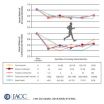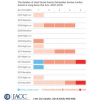(Press-News.org) 1. Early menopausal hormone therapy shows no effect on atherosclerosis progression
Early initiation of menopausal hormone therapy (MHT) improves some markers of cardiovascular disease (CVD) but does not affect the progression of atherosclerosis, according to a study being published in Annals of Internal Medicine. CVD is the leading cause of death in women and incidence increases after menopause. Research suggests that cardiovascular benefits of MHT may be limited to women who begin treatment at a younger age, closer to menopause, or both. Researchers conducted a randomized controlled trial of MHT in women who were within 36 months of their last menses to assess effects of early initiation of oral or transdermal MHT versus placebo on rates of progression of atherosclerosis. Participants were 727 healthy women between the ages of 42 and 58 who were at low risk for CVD. Over four years, the women were randomly assigned to receive oral conjugated equine estrogens, 0.45 mg/d (n=230), transdermal 17β-estradiol, 50 mcg/d (n=222), each with 200 mg of oral progesterone for 12 days per month, or placebo (n=275). Compared to placebo, the two low-dose MHT regimens favorably altered certain CVD risk factors. However, vascular imaging at baseline and at four years showed that MHT had a neutral effect on atherosclerosis progression.
Note: The URL will go live at 5:00 p.m. on Monday, July 28 and can be included in news stories. For an embargoed PDF, please contact Megan Hanks. To speak with an author, please contact Patricia Crenshaw at patricia.crenshaw@kronosinstitute.org or 602-778-1914.
2. More information needed to determine the effectiveness of different types of decision aids for advanced care planning
Decision aids are underutilized for advanced care planning and their effectiveness is not well documented, according to an article being published in Annals of Internal Medicine. An advanced care plan is a directive that explains a patient's goals and preferences for future care in the event of serious illness or injury. Currently, less than 50 percent of severely or terminally ill patients have an advance directive in their medical record and physicians are only about 65 percent accurate in predicting patient preferences for intensive care. Decision aids are intended to help patients consider options in health care so that they may develop an advanced care plan, but little is known about their effectiveness. The authors found that many widely available decision aids have not been assessed for effectiveness, while those decision aids that have been assessed in the published empirical literature are not generally publicly available. Decision aids come in two general types; one type is constructed for the general population, while the other type is disease-specific and intended for disease-specific conditions with more predictable end-of-life scenarios and distinct choices. The researchers identified areas for improvement with regard to decision aids and suggested additional areas for research.
Note: The URL will go live at 5:00 p.m. on Monday, July 28 and can be included in news stories. For an embargoed PDF, please contact Megan Hanks. To speak with an author, please contact Matt DePoint at mdepoint@umn.edu or 612-625-4110.
3. Safety lapses at government labs raise serious bioterror concerns
Recent safety lapses at the Centers for Disease Control (CDC) and National Institute of Health (NIH) facilities illustrate a new and grave bioterror threat: the risk for disease and death emanating from biocontainment laboratories themselves, according to a commentary being published in Annals of Internal Medicine. Author, Deborah Cotton, MD, MPH, Deputy Editor of Annals of Internal Medicine, is Professor of Medicine at Boston University School of Medicine and Professor of Epidemiology at Boston School of Public Health. She is also a member of the Board of Directors of the Infectious Diseases Society of America (IDSA). Dr. Cotton says that recent lapses are so great in number and risk that it is time to suspend all research at biosafety level (BSL) 3 and BSL-4 labs until a thorough review of the incidents can be completed. She cites a recent incident at the CDC where laboratory workers improperly handled and stored live anthrax and another incident where workers inadvertently mixed the deadly H5N1 ("bird flu") influenza virus with a far more benign influenza strain and then shipped it to an outside lab. And in a lab at the heart of the NIH campus, vials of smallpox virus labeled "1954" were found sitting for decades, posing a potential risk for bioterror -- "truly the stuff of science fiction movies," Dr. Cotton writes. She suggests that many factors including human error, poor inventory control, lax or nonexistent policies, and administrative deficiencies played a role in these situations. To contain the terror within, Dr. Cotton suggests greatly limiting the number of BSL-3 and BSL-4 labs opened in the future.
Note: The URL will go live at 5:00 p.m. on Monday, July 28 and can be included in news stories. For an embargoed PDF, please contact Megan Hanks. To speak with an author, please contact Angela Collom at acollom@acponline.org or 215-351-2653.
INFORMATION:
News from Annals of Internal Medicine tip sheet July 29, 2014
2014-07-29
ELSE PRESS RELEASES FROM THIS DATE:
ACS NSQIP database helps hospital identify and curb its surgical risk
2014-07-29
NEW YORK (Monday, July 28 – 5 p.m. ET): Surgical patients who are placed in contact isolation after their operations are at a particularly high risk for developing life-threatening blood clots, but ensuring they move around has helped curb the occurrence of venous thromboembolism (VTE) in one hospital. This case study on how one surgical team prevented VTEs in their patients placed in isolation was presented today by researchers from the department of surgery at Carilion Clinic Roanoke Memorial Hospital, Roanoke, VA at the American College of Surgeons National Surgical ...
Lead pollution beat explorers to South Pole, persists today
2014-07-29
Norwegian explorer Roald Amundsen reached the South Pole in 1911, but new research shows that industrial air pollution arrived long before any human.
Using data from 16 ice cores collected from widely spaced locations around the Antarctic continent, including the South Pole, a group led by Joe McConnell of the Desert Research Institute (DRI) in Reno, Nevada, created the most accurate and precise reconstruction to date of lead pollution over Earth's southernmost continent. The new record, described in an article published today in the online edition of the Nature Publishing ...
Generating a genome to feed the world: UA-led team sequences African rice
2014-07-29
An international team of researchers led by the University of Arizona has sequenced the complete genome of African rice.
The genetic information will enhance scientists' and agriculturalists' understanding of the growing patterns of African rice, as well as enable the development of new rice varieties that are better able to cope with increasing environmental stressors to help solve global hunger challenges.
The paper, "The genome sequence of African rice (Oryza glaberrima) and evidence for independent domestication," was published online in Nature Genetics on Sunday.
The ...
Research letter examines pacemaker use in patients with cognitive impairment
2014-07-28
Dr. Nicole R. Fowler and her fellow reserachers have found that patients with dementia were more likely to receive a pacemaker then patients without cognitive impairment.
Older adults with mild cognitive impairment (MCI) and dementia can have co-existing cardiac illnesses and that makes them eligible for therapy with devices to correct rhythm abnormalities. But the risks and benefits need to be weighed carefully with patients, families and clinicians.
The authors examined data from the National Alzheimer Coordinating Center Uniform Data Set gathered from 33 Alzheimer ...
Electronic screening tool to triage teenagers and risk of substance misuse
2014-07-28
Bottom Line: An electronic screening tool that starts with a single question to assess the frequency of substance misuse appears to be an easy way to screen teenagers who visited a physician for routine medical care.
Author: Sharon Levy, M.D., M.P.H., of Boston Children's Hospital, and colleagues.
Background: Substance use can cause illness and death in adolescents. Screening adolescents and intervening if there is substance use can reduce the burden of addiction. The American Academy of Pediatrics and other professional organizations recommend that primary care physicians ...
Dementia patients more likely to get implanted pacemakers, says Pitt study
2014-07-28
PITTSBURGH, July 28, 2014 -- People with dementia are more likely to get implanted pacemakers for heart rhythm irregularities, such as atrial fibrillation, than people who don't have cognitive difficulties, according to researchers at the University of Pittsburgh School of Medicine. In a research letter published online today in JAMA Internal Medicine, the researchers noted the finding runs counter to expectations that less aggressive interventions are the norm for patients with the incurable and disabling illness.
To look at the relationships between cognitive status ...
Non-endoscopic migraine surgery provides significant symptom relief
2014-07-28
A revised version of a surgical procedure to treat severe chronic migraine headaches led to significant symptom relief more than 90 percent of the time in patients treated at Massachusetts General Hospital (MGH). Physicians from the MGH Division of Plastic and Reconstructive Surgery report that more than half of 35 patients treated with the non-endoscopic procedure – all of whom had headaches associated with compression of craniofacial nerves – reported complete symptom relief a year later. The team's paper has received advance online publication in the journal Plastic ...
Gender disparities in cognition will not diminish
2014-07-28
The study, published in the Proceedings of the National Academy of Science, investigated the extent to which improvements in living conditions and educational opportunities over a person's life affect cognitive abilities and their implications for men and women.
"Our results show that there is no reason to expect all cognitive gender differences will diminish," says Daniela Weber, IIASA researcher and lead author of the study. "However, the findings from this study suggest that if women and men had equal levels of education, then we should expect a female advantage in ...
Running reduces risk of death regardless of duration, speed
2014-07-28
Running for only a few minutes a day or at slow speeds may significantly reduce a person's risk of death from cardiovascular disease compared to someone who does not run, according to a study published today in the Journal of the American College of Cardiology.
Exercise is well-established as way to prevent heart disease and it is component of an overall healthy life, but it is unclear whether there are health benefits below the level of 75 minutes per week of vigorous-intensity activity, such as running, recommended by the U.S. government and World Health Organization.
Researchers ...
Endurance runners more likely to die of heat stroke than heart condition
2014-07-28
Heat stroke is 10 times more likely than cardiac events to be life-threatening for runners during endurance races in warm climates, according to a study published today in the Journal of the American College of Cardiology. The authors noted the findings may play a role in the ongoing debate over pre-participation ECG screenings for preventing sudden death in athletes by offering a new perspective on the greatest health risk for runners.
Two of the most recognized causes of sudden death during an endurance race are arrhythmic death, sudden death usually caused by undetected ...



